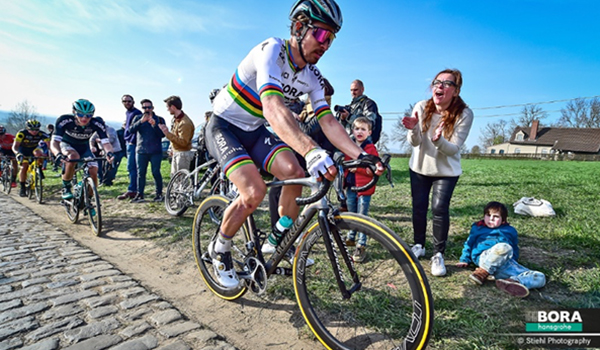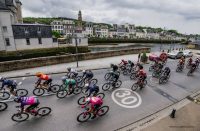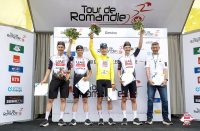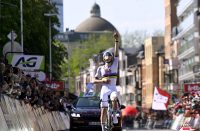
After riding a strategically-strong race from the start, the UCI World Champion, Peter Sagan, showed he had the nous to be in the right place at the right time at Gent-Wevelgem, only to be denied in the closing kilometres. After working hard to try and bridge to a late attack, the Slovak rider found himself in a group unwilling to work with him, and had to settle for third spot on the day. This disappointment only gives the BORA – hansgrohe star more hunger for the win in the coming races as he looks ahead to defend his Tour of Flanders crown.
There’s as much chance of Gent-Wevelgem being won in a bunch sprint as there is a breakaway or solo attack. The UCI World Champion knows this only too well, having won the race both in a sprint and after a surging late breakaway, in 2016 and 2013 respectively. What Peter also knows is that it’s one thing to cover the 249km parcours without incident, while crossing the vast open sections in the first 120km, where riders will be battered by crosswinds, as well as traversing the eleven difficult climbs that will rip the field to pieces in the final 120km, but so much of what leads to victory in this race is pure, simple luck.
It took some time for the break to form – and understandably so, given that the escapees would be riding in a small group over the exposed flatter section of the race, but after nearly 30km of the day covered, a group of nine made their move. With the climbs of the day still a distant spot on the horizon, the peloton was happy to let them build up their advantage to a fairly sizeable six minutes, preferring to stick together as they were battered by the crosswinds, conserving their energy for the climbs. While the reigning champion had his eye on a third victory, other teams had their eyes on the win as well, and were pulling hard to bring the gap to a more manageable margin. By the time the race hit its final 100km, what was a strong lead of almost eight minutes was shrinking by the kilometre.
The first climb of the day out of the way, and it was clear the break didn’t have the legs to see it through to the end. This was when the race’s favourites drove the pace hard both to draw in the break, as well as to put some hurt into their opponents. The important strategic climbs were approaching fast, and being in the right position was essential – as well as being a good opportunity to see how well, or badly, other riders were performing. The first pass of the 22% cobblestone Kemmelberg out of the way, there was a little respite before the second pass and the push to the finish. Peter was giving nothing away, sitting towards the rear of the bunch, as the last member of the break came into view. With it all back together with 40km to go, this was when the racing would really start.
As Van Avermaet attacked from 35km out, Peter instantly latched onto the back, helping drive out the gap and create some distance while taking a few others with them. Another attack from this group left Peter a short distance behind with two others. Peter fought hard, but the other two knew that once the catch was made he was so much stronger than them in the sprint, and so no-one was willing to push on with him. The win taken by Van Avermaet, Peter sprinted to third as the peloton surged from behind.
Clearly disappointed with the reluctance of his group to work with him to bridge the gap, Peter used this frustration to fuel his desire to take more wins in the coming races. “I don’t know what Terpstra wanted to do, because he attacked to go in the breakaway, but afterwards he didn’t want to work. This is just one example of how you can lose the race against me. What can I do – we’re not teammates – I can’t work for everyone, only for them to beat me in the sprint. I’m not disappointed – I’m more motivated now. If you win all the time, you lose your motivation. Now I’m motivated to take some more wins. We’ll see what happens at Flanders and Paris-Roubaix.”
Sports Director, Jens Zemke, was similarly frustrated with the day’s outcome. “To start playing games with 15km to go is not the way to win races. At the moment, it seems that some are more interested in beating Peter than in winning, but that’s cycling. Peter was strong again and always in control until that point – that’s the good thing about today. Also, the team was strong. We still had four guys to support Peter going into the finale.”
With a week until his next race, Peter will concentrate on recovering his form for two of the biggest events of the Classics season: the Tour of Flanders and Paris Roubaix. These races need no introduction, and only the strongest riders will be in contention after a hard day in the saddle. The UCI World Champion will be looking to defend his title in Flanders before attempting to take the win at Roubaix for the first time in his career.




